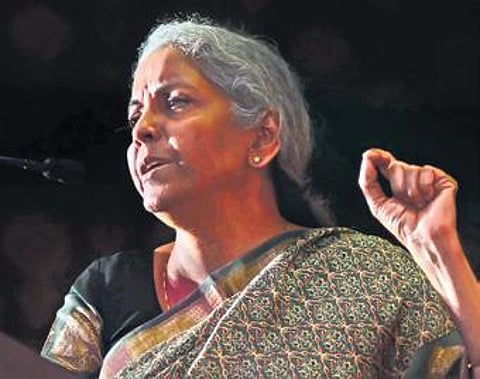

BENGALURU: The Union Government, which is concerned about the rising crude oil prices in the international market owing to the Russia-Ukraine war, may make use of budgetary provisions to tackle the situation. Union Finance Minister Nirmala Sitharaman on Tuesday said that since the spike in crude oil prices will have a bearing on fuel prices in the country, the government will look at ways to cushion the impact.
“Since we import over 85-90 per cent of crude oil, the rise in price is a matter of concern, but alternative sources will also be considered. We are watching the situation closely as to how it pans out. I am conscious about it,” she told a select audience during an interactive session on ‘Atma Nirbhar Indian Economy’, organised by the BJP. The minister hinted at compensating Indian oil companies for the price hike to ensure that consumers do not feel the pinch.
On the Ukraine crisis, Nirmala Sitharaman, while observing that it has posed a lot of challenges, also felt that it has thrown opportunities for countries like India which had seen an increase in wheat export. Even during the Covid-19 pandemic situation, the country, under the leadership of Prime Minister Narendra Modi, took the opportunity to push the ‘Atma Nirbhar’ mantra, as over five crore PPE kits were manufactured, one vaccine was developed indigenously and put at the disposal of the world. “The CoWin application was also a contribution to the world, which means the PM’s Atma Nirbhar is not just for me and you, but for global welfare”, she remarked.
‘Customs duty hike to boost Atma Nirbhar’
Defending the hike in Customs duty on certain imports, Nirmala Sitharaman said that it is to bolster the Atma Nirbhar initiative and is not applicable to intermediary raw materials used by start-ups in the semiconductor sector. India, which had an edge in the past in export of Active Pharmaceutical Ingredients used in the pharma sector, lost out due to predatory pricing by other exporting nations.
Hence, Production Linked Incentives have been implemented to make the pharmaceutical sector Atma Nirbhar and to generate jobs, she explained. Sitharaman pointed out that the sex ratio has also improved to 1,026 females for every 1,000 males between 2014 and 2019, which was previously 970 females for every 1,000 males in 104 gender-sensitive districts across India. The representation of women in panchayats, which was 36 per cent in 2014, has increased to 46 per cent and many states followed the Gujarat model of increasing women’s reservation to 50 per cent, she said.
‘The middle class is everywhere’
Union Finance Minister Nirmala Sitharaman asserted that her budget had addressed the concerns of the ‘middle class in every sector’. When a participant at an interactive session asked what her budget meant for the middle class, especially as there was no difference in the taxation slabs, she replied, “People will never be happy with what I say, because they want ‘a particular answer’ and I don’t give that. I see the middle class in farmers, those in informal jobs, doing their own business and taking loans from banks, those who want to send their children to study abroad and send money. I also see the middle class in startups looking at the government to support them. So, I will see the middle class everywhere,” evoking a huge round of applause.